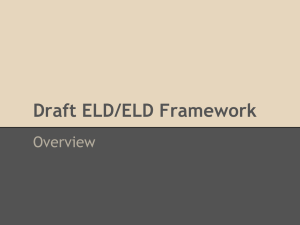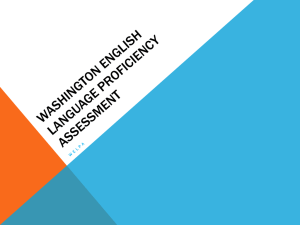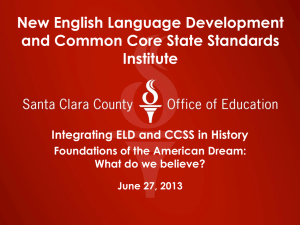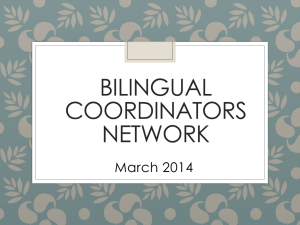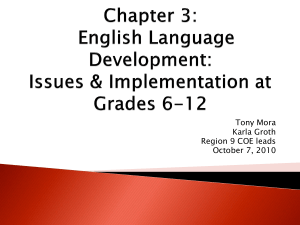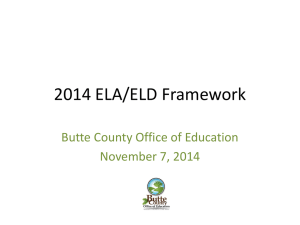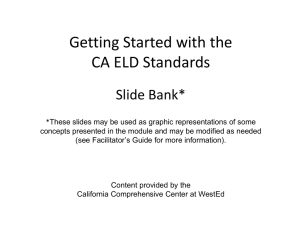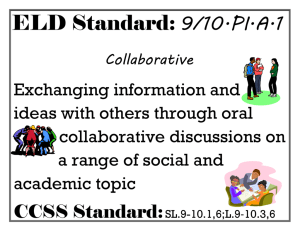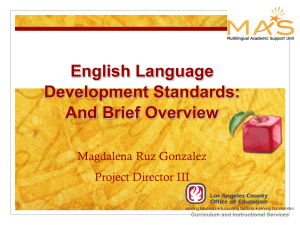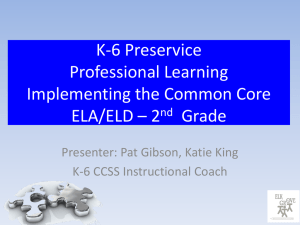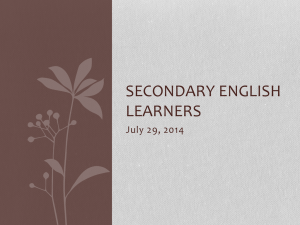Sylvia Solis A IV - Santa Clara County Office of Education
advertisement
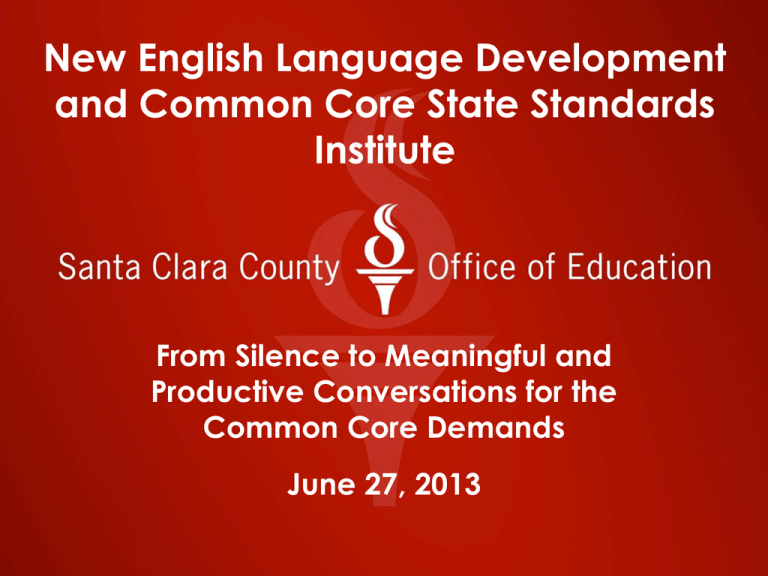
New English Language Development and Common Core State Standards Institute From Silence to Meaningful and Productive Conversations for the Common Core Demands June 27, 2013 Introductions Sylvia Solís A Look at Learning Project Specialist Santa Clara County Office of Education 2 Goal Prepare every English learner for college and career success! 3 Objectives Participants will... Understand the language demands of the Common Core State Standards Understand key shifts in the ELD standards Engage in strategies to produce meaningful and productive conversations. 4 Language Demands from the Common Core State Standards The Common Core State Standards set high expectations for all students to participate in academic discourse across the disciplines. 5 Student Expectations • To sustain dialogue on a range of topics and in a variety of content areas • Interpret the meaning of informational and literary texts • Explain their thinking and build on others ideas • Construct arguments and justify their position persuasively with sound evidence • Effectively produce written and oral texts in a variety of disciplines for a variety of audiences and purposes 6 CA ELD Standards: Design • Aligned with and to be used in tandem with CCSS for • • ELA & Literacy and applied to both ELD and content area instruction Highlight and amplify the critical language, knowledge about language, and skills using language in the CCSS in order for ELs to be simultaneously successful in school while they are developing language Provide fewer, clearer, higher standards so teachers can focus on what’s most important Overview of the California English Language Development Standards and Proficiency Level Descriptors, p 14. 7 Key Shifts 1999 CA ELD Standards From… 2012 CA ELD Standards To… ELD Standards as ELD Standards working in “junior” ELA tandem with ELA and other Standards or as content standards and seen an “onramp” to as the “diamond lane” for the ELA acceleration Standards Spycher, 2012 8 ELD Standards 9 Key Shifts 1999 CA ELD Standards From… Simplified texts and activities, often separate from content knowledge 2012 CA ELD Standards To… Complex texts and intellectually challenging activities with content integral to language learning Spycher, 2012 10 Key Shifts Sentence to unpack: Although many countries are addressing pollution, environmental degradation continues to create devastating human health problems each year. 11 Key Shifts Meaning: Pollution is a big problem around the world. Many countries are doing something about pollution. Pollution destroys the environment. The health problems are really serious. 12 Key Shifts 1999 CA ELD Standards From… 2012 CA ELD Standards To… Instruction that Instruction that artfully treats reading, integrates reading, writing, writing, listening, speaking and listening, and and speaking as language isolated and separate skills Spycher, 2012 13 Key Shifts 1999 CA ELD Standards From… Listening and Speaking Reading Writing 2012 CA ELD Standards To… Part I: Interacting in Meaningful Ways Part II: Learning About How English Works Part III: Using Foundational Literacy Skills Spycher, 2012 14 New CCSS Paradigm: language is central to all academic areas SCIENCE History Social Studies MATH *• LANGUAGE ARTS Olsen, 2013 instructional discourse • expressing and understanding reasoning 15 What do the shifts in the ELD Standards mean for me? • • • ELD Standards working in tandem with ELA and other content standards and seen as the “diamond lane” for acceleration Complex texts and intellectually challenging activities with content integral to language learning Instruction that artfully integrates reading, writing, speaking and listening, and language Select a shift and explain its possible implication/consequence on your work I selected … I think an implication/consequence on my work will be... 16 ELD Lesson Grades 6-8 Intermediate Level Total Number of ELs: 25 6 Early Intermediate 15 Intermediate 4 Early Advanced Length of Lesson: Two periods of 60 minutes for three days Topic: Oral presentation based on The Circuit by Francisco Jimenez 17 CCSS ELA Standard Presentation of Knowledge and Ideas Grade 6: SL. 4 Present claims and findings a. Plan and deliver an informative/explanatory presentation that: develops a topic with relevant facts, definitions, and concrete details; uses appropriate transition to clarify relationships; uses precise language and domain specific vocabulary; and provides a strong conclusion. 18 ELD Lesson: Through the Lens of the CCSS Watch the video and record evidence that demonstrates alignment to CCSS and 21st century skills on the note-taking guide. 19 20 Through the Lens of the CCSS 21 22 A Comprehensive System for Increasing English Learners’ Academic Achievement 23 What is A.L.L.? A.L.L. is a multi-year comprehensive system designed to build instructional leadership and teacher efficacy to apply research-based practices in classrooms that lead to increased language proficiency and academic achievement for English learners. 24 A Look at Learning Cycle 25 Planning to Plan! “Plans are nothing; Planning is everything.” Dwight D. Eisenhower 26 Going Deeper with Planned Language Production • Everyone speaking with support • Everyone is accountable Teacher-Whole Class Small Group Partners Individual 27 Examples of Non-Accountable Responses • • • • • • • Who knows what _______ means? Can anyone tell me_______? Who has an example of ______? Would anyone like to share? Share your answer with your neighbor. Discuss these questions in your group. Anytime we “call on someone” (with or without sticks) 28 Frames vs. Stems 1. Why do we need them? 2. What is the difference? • Sentence frames TEACH language • Sentence stems or starters elicit student thinking 29 Unstructured Prompt without a Frame or Starter Prompt: How does your best friend get to school? Students do not ask each other the prompt. They just answer the question. Answers: • She take the bus. • He walking to the school. • He ride his bike. • She drived with her mom. 30 Sentence Starters… Provide little structure for accurate asking or response Leave it to students to figure out how to construct the sentence Often result in erroneous language use. Non-example: Prompt: How does your best friend get to school? Starter: My best friend____________________. walking at the school walks to the school walked to school 31 Sentence Response Frames with a word bank and structured partners A: How does your best friend get to school? B: My best friend ______s to school. Verb Bank: (present tense +s) walks rides her bike gets a ride 32 Sentence Response Frames with prompt, frame, and parts of speech A. How does your friend get to school? B. My friend verb to school adverb. Verbs walks rides her bike takes the bus gets a ride Adverbs frequently sometimes often 33 Stem & Frame Resources • Look over the stem and frame resources in your packet. • Note how they are different. 34 Quick Quiz: Frame or Stem? 1. I discovered… 2. The differences between _____________ and ____________ are____________( with prompt and word bank) 3. The writer mentions _______________________ and illustrates the point by emphasizing that ____________________________ (used after brainstorming). 4. I agree with _______’s idea and I’d like to add __________. 35 The key is to make an intentional instructional decision… • Am I trying to start discussion? • Am I trying to teach language? If so, what kind of language? • Would a sentence frame stifle creativity? • Would a sentence stem be too open? 36 PLP During the Opening & Presentation How can we include Planned Language Production opportunities while using the following strategies in a lesson: Choral Response Echo Repeat Turn to a partner Hand motions White boards or writing I could use the _______ PLP strategy in my classroom when ___________________. I would adapt the ______ PLP Strategy by ___________________ 37 The “How” of the PLP: Choosing a Language Production Routine • Once you have your frame or your stem, you must determine how students will practice… • Small Group • Student to Student • Student to Teacher 38 Strategies in Action Think about examples observed in the video of Planned Language Production opportunities or the use of sentence stems or sentence frames… An example of ________ was… Another example of ____ was… I’d like to add another example… 39 Language is a Vehicle to Understand Content “Learning subject matter and work skills involves using language to structure understanding and core knowledge, to connect concepts with other understanding, and to practice multiple literacy skills within meaningful content-rich activities.” Alliance for Excellent Education, 2012 40 CCSS alone do not provide a pathway towards English proficiency for ELs • New English Language Development standards aligned to the CCSS (adopted November 2012) • Implementation of CCSS must be accompanied by full implementation of the new ELD standards Olsen, 2013 41 Register “The type of language we use in particular situations when communicating with a particular set of people to meet the expectations of a particular context” Spycher, 2012 42 Resources A Look at Learning http://mes.sccoe.org/all/Pages/default.aspx California English Language Development Standards http://www.cde.ca.gov/sp/el/er/eldstandards.asp eStandards App http://scoecurriculum.net/estandards/support/ Resources from Dr. Kate Kinsella http://mes.sccoe.org/ell/Pages/Kinsella-AcademicDiscourse.aspx 45
